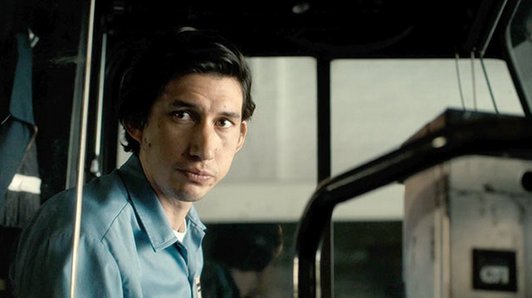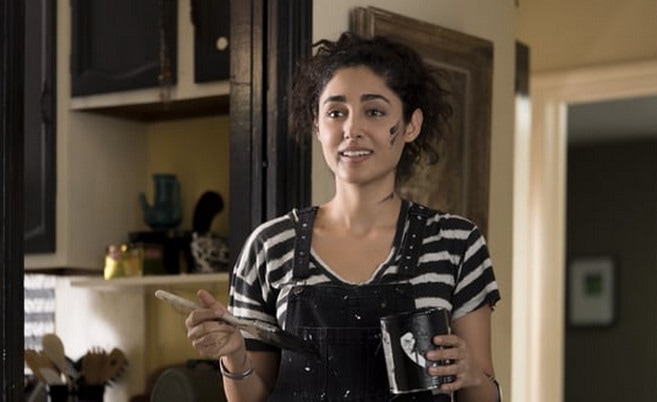
Reviewed by Manohla Dargis / New York Times
Poems slip across the screen like water in “Paterson,” Jim Jarmusch’s wonderful new dispatch from Jarmusch-land. Sometimes they appear over water, too, surfacing word by word on images of the Great Falls along the Passaic River in Paterson, N.J. No pen or pencil directly spells out these words, no clattering keyboard or banging typewriter. Instead, the words — in a neat, cramped hand — appear onscreen as they are read aloud by their author, Paterson (Adam Driver), a soulful bus driver and basement poet. It’s as if he were beaming his heart-song straight from his head into yours.
A movie about art, creation and how images become words (and vice versa), “Paterson” seems deceptively simple. Its hero, Paterson, works in (where else?) Paterson. Every weekday, he rises early, kisses his beloved, Laura (Golshifteh Farahani), and heads off to work, where he turns the ignition on a big city bus and rumbles into the bright world. Some of that world comes to him, clambering onboard in a blur of ages, hues and conversational interests. Mostly, Paterson looks out through the bus’s windows, views that turn life into discretely framed images.
It’s a quiet life, its rhythms determined by labor and the old Monday through Friday routine. Like most people’s workweeks, his story opens on a Monday, that word stamped on the screen. Dividing stories into units of time, into hours and days, is a familiar structuring device, sometimes used for suspense or to create a countdown. Stanley Kubrick inserted days on title cards in “The Shining,” jumping from “Tuesday” to “Thursday,” a gap that suggests that something is amiss with time itself and that amps the unease. In “Paterson,” by contrast, the march of days announces both the regimentation of Paterson’s punch-clock obligations and the story’s structure, its pattern.
Patterns — including yards of circles, dancing squiggles and twinned images — fill “Paterson,” creating a vibrant visual punctuation to the otherwise relaxed storytelling. Mr. Jarmusch likes to take it nice and easy, and this movie is fairly low-key, even by his fairly chill standards. Paterson’s work demands consistency, routine, punctuation and safety which create a kind of meditative flow. Passengers come and go, embarking and disembarking and talking or kidding about this and that. Paterson cocks an ear to listen to this human babble, bobbing in and out of its stream before heading over to the city’s magnificent Great Falls to eat lunch.
At home, Paterson spends time with Laura, his stay-at-home partner (she shares her name with Petrarch’s love), who nurtures her passions mostly by adorning every surface — walls, curtains and even clothes — with patterns. Laura is the movie’s one minor letdown, partly because she seems more frivolous than Paterson, with pursuits that are more hobbies than they are brow-furrowing art. He writes poems and reads deeply; she bakes cupcakes and buys a guitar off YouTube, announcing her unlikely dream of becoming a country singer. She’s an appealing, lightly comic figure whose main job is to be Paterson’s helpmate — his chef, cheerleader and, of course, muse.
The female muse can be a nice racket, of course, but it’s a strangely old-fashioned his-and-her configuration for a director like Mr. Jarmusch, whose work otherwise evades creaky norms. It’s a minor complaint in a movie that is otherwise pretty flawless, which takes thinking, creating and beauty seriously but also includes a delectably funny, slow-building sight gag and plenty of shameless doggy reaction shots, courtesy of Marvin (Nellie, a scene stealer), the couple’s bulldog and Paterson’s nemesis. There’s also some low-burning comedy in the local bar where, each evening, Paterson ties Marvin outside and drops in for some conversation with the bartender, Doc, whose nickname is likely a nod to another doc, William Carlos Williams.
Williams lived and practiced medicine near Paterson, and borrowed its name for his multipart epic poem, which, he wrote, involves “the resemblance between the mind of modern man and a city.” He opens the first of its volumes by declaring, “Rigor of beauty is the quest,” only to ask, “But how will you find beauty when it is locked in the mind past all remonstrance?”
Williams suggests that the answer is “to make a start, out of particulars and make them general,” adding that all we know is our “own complexities.” As Paterson writes, Mr. Jarmusch sometimes fills the screen with particulars — Laura’s face, the crashing falls — superimposing them as if to suggest ideas swirling into words, patterns and poetry.
The poems that Paterson writes are by the American poet Ron Padgett. One, titled “Love Poem,” opens with a simple, direct declaration about a humble household object, matches: “Currently our favorite brand is Ohio Blue Tip.” At first, the writing is precise, concrete and pictorial, and includes descriptions of both the boxes, with their “dark and light blue and white labels,” and of the matches, with their “one-and-a-half-inch soft pine stem.” With a flourish (like that of a lighted match), the language veers into the metaphoric (the match heads are “sober and furious”), only to end with soaring lyricism and a love note: “I become the cigarette and you the match.”
A similar progression — from the basic to the rhapsodic, the material to the transcendent — happens in “Paterson” as days pass, details accumulate, and words turn into poetry, one line at a time. Things happen to Paterson — he has a rough Friday and Saturday, though a better Sunday — but Mr. Jarmusch doesn’t turn problems into drama. Life is enough. Instead, with visual precision and emotional restraint — and aided by Mr. Driver’s tamped-down, sober and gently endearing performance — Mr. Jarmusch creates that rarest portrait of the artist: the one who’s happy being hard at work.
A DISCUSSION FOLLOWS EVERY FILM!
$6.00 Members / $10.00 Non-Members
TIVOLI THEATRE
5021 Highland Avenue
Downers Grove, IL
630-968-0219
www.classiccinemas.com
$6.00 Members / $10.00 Non-Members
TIVOLI THEATRE
5021 Highland Avenue
Downers Grove, IL
630-968-0219
www.classiccinemas.com







